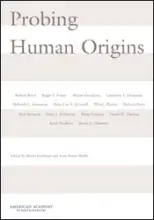
“Probing Human Origins” explores, from various perspectives, how humans became human. This collection of papers acknowledges the importance of genetic ‘blueprints’ but rejects the idea that the DNA sequence of the human genome contains a book of instructions that defines being human. Instead, it promotes the idea that during humankind’s evolutionary history, genic changes occurred in ancestral genomes that were positively selected to help shape the distinctive human phenotype. This view complements the idea that our social and physical environments guide how we act. Thus, a major trend in humankind’s evolutionary history has been the selection of genomes that gave their bearers the brain power to use learned, culturally transmitted behaviors to cope successfully with an increasing range of external challenges. Paradoxically, because of humankind’s genetic evolution, the future of the human species now depends most heavily on further cultural-social evolution rather than biological evolution.